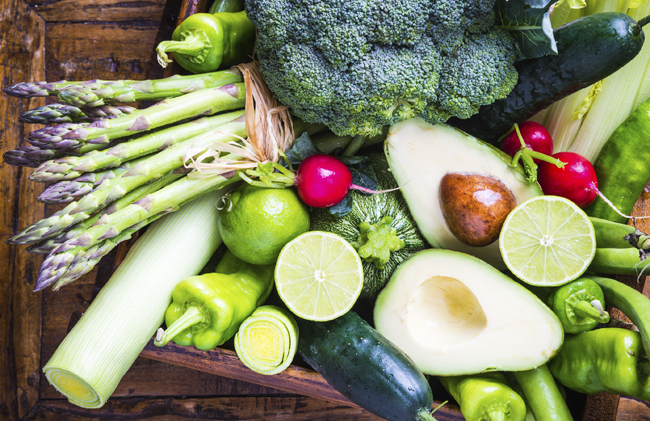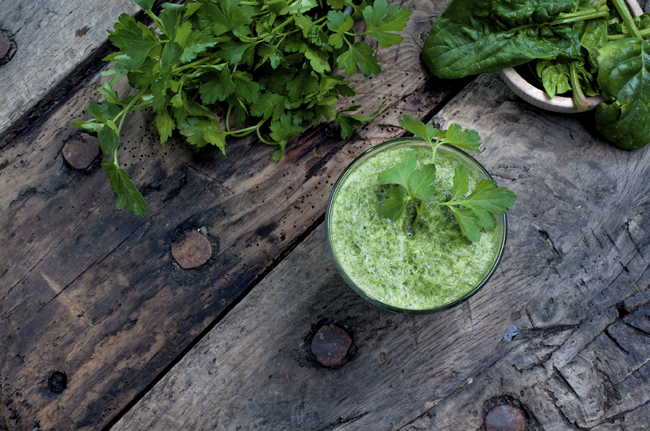Seasonal sniffles? Nutritional therapist Becky Graham says it’s not the weather, it’s the health of your immune system. Try her flu-fighting foods to help eat your way to health this winter…

At this time of year, with the memory of summer fading fast as we get our heads down for autumn, why do we suddenly find ourselves prone to colds and flu? The cold virus is one of the most common in the world and, while it may seem that infections come and go with the seasons, what makes us more susceptible is not the time of year but the health of our immune system.
The average adult typically has two to four colds a year. For children it can be as many as 12. With about 200 known cold viruses, it’s easy to see why! A cold lasts for around nine days, with varying symptoms and degrees of congestion, coughing, headaches, sore throats and fatigue. But while some of us breeze through a cold, some suffer more than others. This may simply be down to genetics, but there are many contributing factors that can place an extra load on our immune system, making us more vulnerable to infection.
Eating a diet high in sugar or refined carbohydrates, not getting enough sleep, stress, lack of exercise, food sensitivities, dehydration, an imbalance in gut bacteria, and reduced exposure to sunlight can all impact on our immune system. The good news is there are lots of ways we can support our immune systems to help keep us healthy through the winter months. The immune system drives a complex, ever-changing interaction between our bodies and the external environment. It is made up of a network of cells and chemical messengers whose job is to distinguish between what is ‘self’ (substances found naturally in our bodies) and ‘non-self’ (external foreign invaders), and to defend us against bacteria and viruses.
Coeliac disease, where the immune system attacks our own cells and tissues, is an example of being unable to distinguish between friend and foe. Gliadin, a protein found in wheat, barley and rye, causes the immune system to cross-react with the tissue of the small intestine, causing an inflammatory reaction and the blunting of the small finger-like projections on the intestinal lining. The result inhibits the absorption of nutrients and may lead to deficiency that will impact immune system function.
There are three main ‘gates’ of the immune system: our skin, lungs and digestive tract. Our skin forms a protective layer and secretes an acidic sebum to inhibit bacterial growth. Our lungs are lined with a sticky mucus that traps pesky air-born viruses. The action of sneezing or coughing is actually our body’s attempt to expel invaders from the respiratory system. Interestingly, for many cold viruses, the eyes are the main points of entry, so next time someone sneezes, cover your eyes!

However, it is our gut that is the number-1 barrier between us and the outside world. Between 70 and 80 percent of our immune system is based in the tissues surrounding our digestive system, which is exposed to foreign substances on a daily basis simply through the process of eating. A gel-like mucus forms a protective barrier lining our digestive tract, and our stomach secretes enzymes and hydrochloric acid to kill any harmful bacteria.
Further along the digestive tract, the intestines are constructed of a series of tight junctions, creating a selectively permeable lining which, if working properly, should let beneficial nutrients through and keep out any larger food particles or damaging bacteria. Often if there is an irritant to our gut, such as gluten, substances may be able to pass into systemic circulation. Because the gut is so key to immune health, even where there are no obvious digestive symptoms, any imbalances can increase the risk of infection, inflammation and allergies. How well the gut barrier and gut bacteria are functioning may determine how well our immune system works. Working to balance the relationship between the internal and external to reduce the load on the immune system can be achieved by adjusting our diet and nutrition, reducing our exposure to toxins or improving our ability to deal with them.
Key Nutrients- Vitamin C and Antioxidants
Extensively researched, vitamin C is unquestionably the key immune supporting nutrient. It may not help to prevent you getting a cold, but loading up at the first sign or symptom of a cold can help reduce its duration and limit its intensity. Brightly coloured fruit and veg
are packed with vitamin C – the key is in their pigment – but contrary to common perception, oranges are not your best source. You are far better loading up on broccoli and berries!
Strawberries have more vitamin C than oranges, and blueberries are the richest source of antioxidants; raspberries are also a great option. So if you feel a cold coming on, get snacking on the berries! Vitamin C is itself an antioxidant but there are many other antioxidants such as vitamin A, made from its precursor, beta-carotene, found in highly pigmented fruit and vegetables like carrots, peppers and spinach. Vitamin E, zinc and selenium are also key immune nutrients, abundant in most nuts and seeds, that help to disarm any invading bacteria or virus.
Other antioxidant-rich food include red wine, dark chocolate and coffee… and consumed in moderation get bonus points for helping to cheer you up when you’re feeling under the weather!
Vitamin D Vitamin D is synthesised in our skin from exposure to sunlight. However, thanks to our climate in the UK, defi ciency is very common in this country – it’s suspected that 90 per cent of us aren’t getting enough. Vitamin D is important in preventing viral infections, reducing inflammation and protecting us against common illnesses, including colds and fl u. Low levels have also been linked to common cancers, autoimmune diseases, depression, heart disease, high blood pressure and infectious diseases.
Food sources of vitamin D are fatty fish like salmon, trout, mackerel, sardines and fresh tuna, though to reach optimal levels you would need to be eating these foods at least once or twice per day, so it may be worth considering a supplement. You can ask your doctor to check your Vitamin D levels, or you can order a finger prick kit to test yourself at home.

Ten Immune Supporting Essentials
- Mushrooms – a source of vitamin D – leave them outside in the sun for 30 minutes to increase their natural vitamin D content. Shiitake mushrooms in particular contain polysaccharides plus zinc, which have been shown to increase the production of white blood cells.
- Garlic – a well-known anti-viral. As the essential oils move through the respiratory tract, they can help to pick off any lurking bugs or viruses. If you can face it, raw is best!
- Yogurt – a healthy gut means a healthy immune system, and probiotic live yoghurt in your diet can help to support beneficial bacteria. Look for products containing strains of lactobacillus.
- Cruciferous vegetables – cauliflower, broccoli and Brussels sprouts are rich in antioxidant vitamins and contain choline, an essential nutrient to keep our cells functioning properly and support a healthy gastrointestinal barrier. Cauliflower is also rich in glutathione, our body’s most powerful antioxidant.
- Carrots – a top source of betacarotene, which helps to promote healthy mucus membranes in the respiratory and intestinal tracts.
- Eggs – a rich source of protein and provide all the fat-soluble vitamins: A, D, E and K important for immune function. They also contain B vitamins for energy and key minerals zinc and selenium.
- Greens – Kale, spinach, and Swiss chard contain high levels of vitamin C. It can help to fight off infection and regenerate other antioxidants in the body such as vitamin E. They are also a source of folate, important for immune function.
- Cinnamon has antiviral, antifungal, and antibacterial properties. It’s great mixed with oats, which contain beta glucans that work to
optimise our response to diseases and infections. - Ginger – contains powerful anti-inflammatory compounds that may help the congestion caused by upper respiratory tract inflammation.
- Watermelon – packed with nutrients. Lycopene, also found in tomatoes, gives watermelon flesh its red colour and offers an array of benefits, including reducing respiratory inflammation. The seeds are rich in protein, zinc, selenium, vitamin E and essential fats – blitz them along with the flesh for a superpowered juice
For more advice consult a BANT registered Nutritional Therapist (BANT.org.uk)
 Becky Graham, DipION, mBANT, is a registered nutritional therapist based at the renowned Institute for Optimum Nutrition in Richmond, London. She is trained in functional medicine, which uses a completely personalised approach to nutrition, working with a wide range of conditions from stress and low energy to digestive or hormonal imbalances. As well as working with clients on an individual basis, Becky works with large companies to support health and wellbeing initiatives. Combining nutrition with work in television, she is passionate about supporting busy lifestyles with food. You can find her at www.healthyhedonist.co.uk
Becky Graham, DipION, mBANT, is a registered nutritional therapist based at the renowned Institute for Optimum Nutrition in Richmond, London. She is trained in functional medicine, which uses a completely personalised approach to nutrition, working with a wide range of conditions from stress and low energy to digestive or hormonal imbalances. As well as working with clients on an individual basis, Becky works with large companies to support health and wellbeing initiatives. Combining nutrition with work in television, she is passionate about supporting busy lifestyles with food. You can find her at www.healthyhedonist.co.uk
